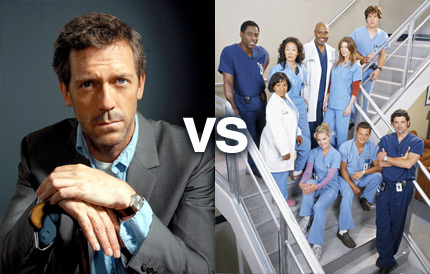Chase: How would you feel if I interfered in your personal life?
House: I’d hate it. That’s why I cleverly have no personal life.
If you replace “personal life” with “personal issues,” I could have written those lines (although much less eloquently and using three times as many words). It’s much harder to be hurt when you just don’t have issues–right?
Along the same lines, Chase and House have another conversation later in the show:
Chase: Why does everybody need to know my business?
House: People like talking about people. Makes us feel superior. Makes us feel in control. And sometimes, for some people, knowing some things makes them care.
Chase: I’d tell you my dad left, my mum drank herself to death… you gonna care about me more?
House: Cameron would. Me, I just like knowing stuff. [pause] I know you hate your dad, but I’m gonna tell you something –
Chase: I don’t hate him. I loved him until I figured out it hurts a lot less to just not care. You don’t expect him to turn up to your football match? No disappointments. You don’t expect a call on your birthday, don’t expect to see him for months? No disappointments. You want us to go make up? Sink a few beers together, nice family hug? I’ve given him enough hugs. He’s given me enough disappointments.
If you don’t care — or can dismiss anything unpleasant as being a nonissue — then it’s much harder to be hurt. Isn’t that convenient?
However, notice that House does not have many friends (…and poor Wilson!). He’s semi-miserable and no one can ever make him feel better. Even the drugs aren’t doing it.
Okay, so I’m not House, but I am pretty good at always being okay. I hate the thought of others suspecting that there’s something wrong. I told my therapist the other day that it literally HURTS to be not-okay in front of someone else. It’s hard for me to explain why, but I just hate it. I would respond just like Chase: “Why does everybody need to know my business?” My mantra is, “If said person is not really in my everyday life and is not someone that I need to turn to for support, then why do they need to know if I’m struggling?”
“I don’t care” is in a way an ugly way of saying “I’ve reset my expectations.” Chase’s dad was never going to be reliable. He wasn’t going to play the father role that Chase needed. He learned that and adapted. Personally, I think that’s a relatively healthy response (especially if the alternative is continually being re-upset every time you dad doesn’t show up, for the rest of your life).
I think that it’s important to find support in other places if you can’t get it from your parents. That said, I also don’t think you can get over the loss of that relationship 100%. He still wishes that things could be different between them, and he was bothered by his dad’s being there because it is still a sore spot for Chase. Having a hundred caring friends is still just not the same. You try and get the support that you need from other people, and that does help. And you grieve the loss of that relationship, which sucks, but also helps. But…. still, that longing does not completely disappear (okay, clearly I am talking about myself now and not so much Chase).
My point of all of this (which I am not doing a good job of expressing) is that just not caring does have its advantages. Life is much simpler when everything is “okay.” You’re not disappointed if you set the bar low. However, by lowering your expectations like this, you are also isolating yourself more. It gets lonely and frustrating when you won’t let others in. Because I can’t stand the thought of struggling when out with others, I am left to deal with all of the emotions on my own. By eliminating the possibility of being disappointed, I think that I also eliminate my chances of feeling better.
When I think about all of the people that I care about, the ones closest to me are those who know what’s going on in my life. We talk about more than just coffee, the weather, our pets, television, work, etc. It’s that humanness of NOT always being okay that makes us care about one another. While it is definitely adaptive in some circumstances to re-evaluate what realistic expectations for that relationship are, I personally can’t turn that caring / trusting thing on and off. Chase did have an honest conversation about the relationship he has with his dad (albeit, the conversation was not his idea and it was with House…), and they clearly left on a better foot than they started on. I think he feels at least a little bit better. House, who has “no personal life,” though, likely went home and sat his couch by myself, popping vicodin. Having no personal life is not that clever.

 And this isn’t just with residential treatment… but with day treatment or even IOP! Which makes it even more bizarre, because you wake up an adult, spend your day as a five-year old, and go to bed again that night as an adult.
And this isn’t just with residential treatment… but with day treatment or even IOP! Which makes it even more bizarre, because you wake up an adult, spend your day as a five-year old, and go to bed again that night as an adult.
